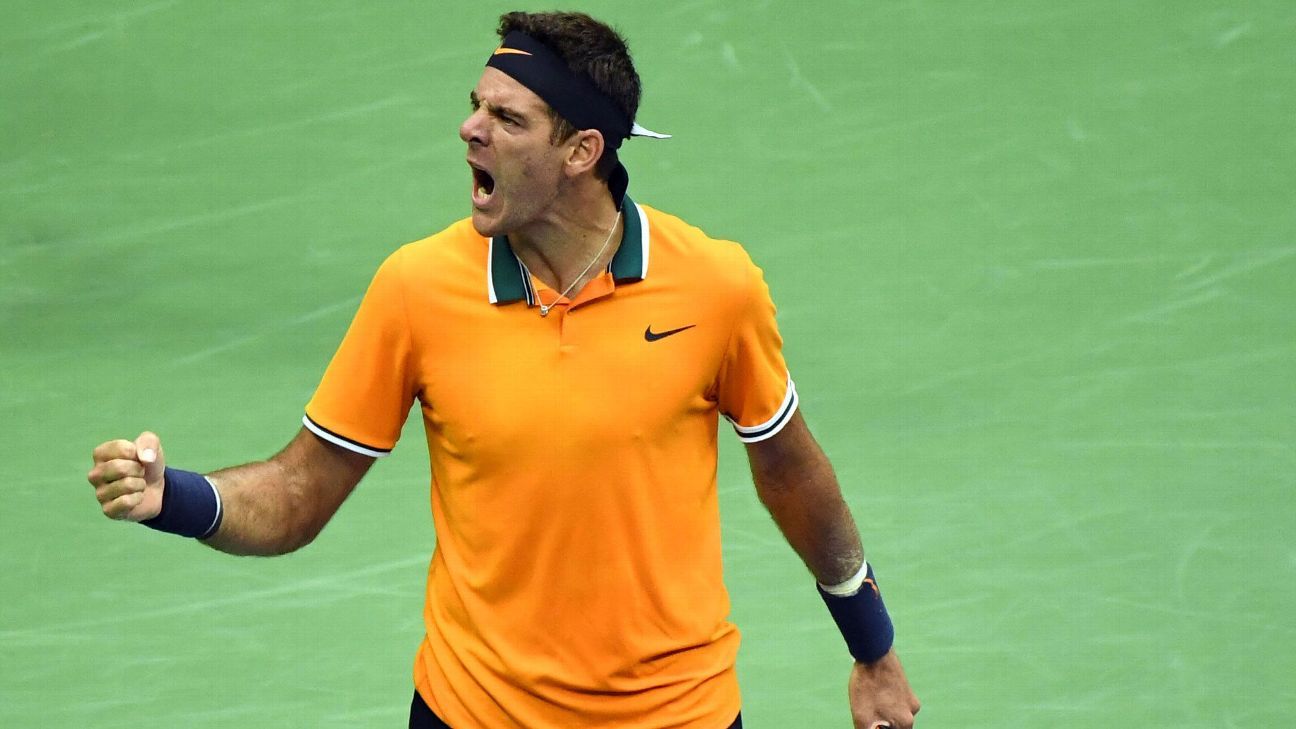Juan Martin del Potro will soon be back among us, belting those monstrous forehands and serves, unless things go horribly wrong. In Del Potro’s case, that worst-case scenario is an omnipresent possibility.
The Argentinian star is entered in the upcoming Madrid Masters tournament (May 5-12). Apart from an aborted February comeback, it will be the beloved 6-foot-6 master blaster’s first tournament since October, when he fractured a knee.
Del Potro turned 30 in September. He has outgrown many aspects of his precocious youth in tennis, from those sleeveless T-shirts to his typical introvert’s fear of public speaking. But “Delpo” has not gotten over the physical frailty that has repeatedly interrupted has career ever since that astonishing evening in 2009 when, still just 20 years old, he overpowered heavy favorite Roger Federer in the US Open final.
That triumph remains his only Grand Slam title. Delpo might have locked down a few more, but a career-long intimacy with surgery and rehab (mainly due to multiple wrist problems) began just four months after his spectacular breakthrough.
When healthy, Delpo has been perhaps the most disruptive force in tennis — a player more feared than fearful even among the elite pros, including the Big Four. Craig O’Shannessy, an ATP analyst who has advised Novak Djokovic and other highly ranked players, told ESPN.com: “Delpo can take the match into his own hands. He has that great power from the serve and forehand, and he’s patient with his backhand. He rarely beats himself, and he has every weapon needed to beat everyone on any given day in our sport.”
The Big Four can attest to that analysis. Del Potro had a two-sets-to-none lead over Rafael Nadal in the semifinals of the US Open in September when Nadal retired with knee problems of his own. At the 2012 Olympics, Delpo lost to Federer in the semifinals, 19-17 in the third set. His response? He denied Djokovic, the other beaten semifinalist, the bronze medal.
Most recently, Delpo stopped Federer in a three-set thriller of an Indian Wells final last year. While he trails Federer 18-7 in their series, he holds a 4-2 edge on the Swiss icon in finals.
“I’m not sure why the final record is the way it is,” Federer told reporters after that 2018 Indian Wells loss. “A lot of them [matches] have been extremely tight, so it’s been tough against him.”
John Isner, who lost to Del Potro in four sets in the quarterfinals of the US Open last year, said afterward: “When he gets control of the point, it’s very tough to wrest it back from him. That’s what he does so well.”
Due to his injuries, Delpo has been denied the opportunity to impose his big game on a consistent basis. He’s currently ranked No. 9, and when he hit No. 3 in August, it was a career high — one tick better than the No. 4 ranking he first reached in January 2010. In between those times, he has been out of the top 100 for long periods twice, and out of the top 1,000 twice.
What is it that keeps the free-swinging right-hander coming back? Though he has earned the admiration and respect of his peers — as well as legions of fans — because of his struggles, above all else he’s a warrior. The vibrant colors of his world go monochromatic when he’s out of action. He has tearfully admitted that he’s been close to calling it a career a few times, but it kills him not to have tennis.
Delpo returned to action briefly at Delray Beach in mid-February, hoping to continue into March and defend the title he won at Indian Wells in 2018. But the attempt proved premature. He won two matches, then withdrew.
“The doctors say I need time if I want to be 100 percent, but I don’t want to be home watching the tournaments on TV,” Delpo explained to the ATP at Delray. “I’ve done that before and it was really bad for me.”
Don’t discount Del Potro’s chances when he returns on clay this spring. That bread-and-butter power game may be most productive on hard courts, but Del Potro earned his first two titles on clay a decade ago and has logged two more on the red dirt in the intervening years. Plus, he has been a French Open semifinalist twice, losing to Federer in 2009 and Nadal last year.
“Anyone who runs into Rafa on clay will be in trouble,” O’Shannessy said. “The big key for Juan Martin is a decent draw and his movement, specifically how well he can defend and do things to make an opponent dampen his own intentions.”
Del Potro specializes in taking the racket out of opponents’ hands. His biggest challenge has been keeping his hand on his own. Here we go again.
